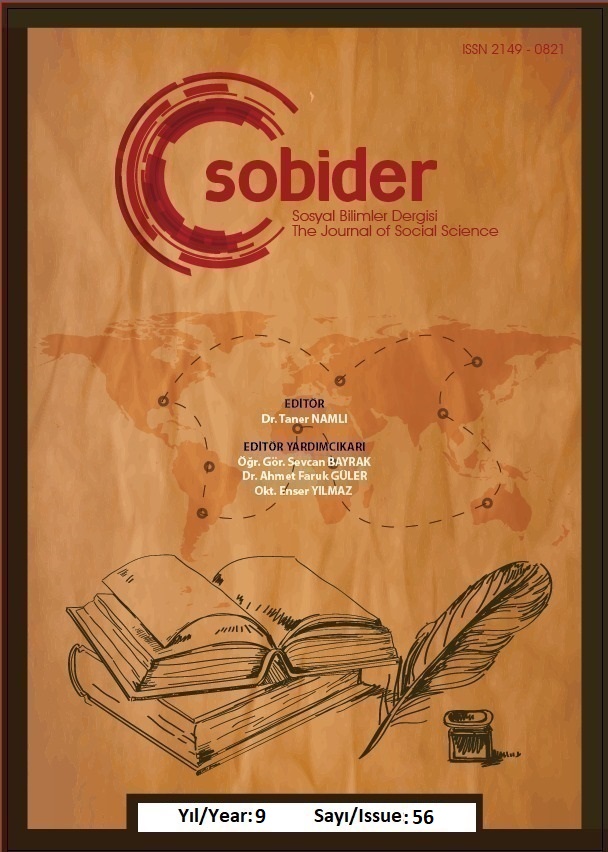Author :
Abstract
Parlamento, anayasa ve bütçe hakkı arasında önemli bir ilişki vardır. Demokratik devletlerin temeli anayasaların hazırlanması ve kabul edilmesi sayesinde olmuştur. Anayasaların ortaya çıkması da vergilendirme ve vergilendirmenin devamı niteliğinde olan bütçe hakkı ile olmuştur. İngiltere’de ortaya çıkan ilk anayasa temelinde vergilendirme ve bütçe hakkını barındırır. Bütçe hakkı Magna Carta’ya dayanmaktadır. Modern anlamda meclisin bütçe hakkı, Magna Carta’dan itibaren gelişmeye başlamıştır. Türk tarihinde anayasal çalışmalar Osmanlı Devleti’nde Sened-i İttifak ile ortaya çıkmıştır. Bütçe hakkı ise Tanzimat Fermanı ile ortaya atılmış fakat gerçek anlamda meclisin bütçe hakkı olarak uygulanması Kanun-i Esasi ile gerçekleşmiştir. Kanun-i Esasi de temelinde vergilendirmeyi ve bütçe hakkını düzenlemeyi amaçlamıştır. Meclisin bütçe hakkı, cumhuriyet döneminde 1924 anayasası ile modern anlamda bütçe hakkı olarak düzenlenmiş ve 1961 anayasası ile gelişmiştir. Meclisin bütçe hakkı Türkiye’de de dünyadaki gibi vergilendirmenin kısıtlanması sebebi ile ortaya çıkmıştır. Vergilendirmenin düzenlenmesi ve buna bağlı olarak bütçe hakkının meydana gelmesi de anayasaların ortaya çıkmasına temel oluşturmuştur.
Keywords
Abstract
There is an important correlation between the parliament, constitution and budget right. The preperations and legislations of constitutions are main foundations of the democratic states; and the constitutions derived from taxations and budget right, as budget right is a follow-up to taxations. The first written constitution, Magna Carta, has taxations and budget right underlying in its foundation. In general manner, modern parliaments’ budget right started developing from Magna Carta. The Turkish constitutional exercises started with “Sened-i İttifak”. The budget right was suggested in the Imperial Edict of Gülhane for the first time. “Kanun-i Esasi”, the first constitution of the Ottoman Empire, gave the budget right to the parliament for the first time. The main purpose of “Kanun-i Esasi” was to regulate the taxation system and the budget right. The Turkish Grand National Assembly’s budget right was initially legislated in 1924, and was further improved in 1961 constitution. Although the budget right was created in consequence of taxation restrictions; the adjustments about taxations and the creation of the budget right caused the constitutions to be created and the parliaments to have legislative prerogatives.
Keywords
- Aksoy, Ş. (1993), Kamu Bütçesi, İstanbul, Filiz Kitabevi. Albrow, M. (1970), Bureaucracy, London, Pall Mall Press.
- Esen, N. B. Anayasa Hukuku: Genel Esaslar, Ankara, Ayyıldız Matbaası, 1970, s. 494.’dan aktaran Gözler, K. “İngiltere’de Parlamento Neden ve Nasıl Ortaya Çıktı: Malî Hukukun Anayasa Hukukundan Eskiliği Üzerine Bir Deneme”, Prof. Dr. Mualla Öncel’e Armağan, Ankara, Ankara Üniversitesi Hukuk Fakültesi Yayınları, 2009, c.I, s.365-374
- Doğan, K. C. & Şentürk, S. H. (2017). İngiltere’de On Yedinci Yüzyıl Devrimler Çağı Ve Parlamentarizmin Gelişimi Doğrultusunda Bütçe Hakkı . Karadeniz Teknik Üniversitesi Sosyal Bilimler Enstitüsü Sosyal Bilimler Dergisi , 7 (14) , 353-373
- Feyzioğlu, B.N. (1983-1984). Modern anayasalarda bütçe hakkı. İ.Ü. Fakültesi, Maliye Araştırma Merkezi Konferansları 29. Seri, İstanbul,1-28.
- Gölçek, A. G. (2014). Bütçe kavramı ve bütçe hakkı: Tarihsel bir inceleme. Vergi Raporu, 0(182), 132 - 139.
- Güran, T. (1989). Tanzimat Döneminde Osmanlı Maliyesi: Bütçeler ve Hazine Hesapları, (1841-1861). Ankara: Türk Tarih Kurumu Basımevi
- Meriç, M. (1993). Osmanlı bütçe sistemi. D.E.Ü. İ.İ.B.F Dergisi, 8 (1), 226-247.
- Mutluer, M. K., Öner, E. & Kesik, A. (2011). Bütçe Hukuku, İstanbul: İstanbul Bilgi Üniversitesi Yayınları.
- Narter, R. "Anayasal Açıdan Bütçe Hakkı". Erzincan Binali Yıldırım Üniversitesi Hukuk Fakültesi Dergisi XVI (2012 ): 35-52
- Öner, E. (2007). Osmanlı Bütçeleri (1864, 1869, 1877, 1880, 1897) Osmanlı Muvazene Defterleri. Ankara: T.C. Maliye Bakanlığı Strateji Geliştirme Başkanlığı Yayın No: 2007/372.
- S. B. Chrimes, English Constitutional History, Oxford, Oxford University Press, 1953, s. 73 ‘dan aktaran Gözler, K. “İngiltere’de Parlamento Neden ve Nasıl Ortaya Çıktı: Malî
- Sayar, S. N. (1956). Amme Maliyesi-Devlet Bütçesi Prensipleri ve Tatbikatı (II. Baskı.). İstanbul: T.C. Maarif Vekaleti İstanbul Yüksek Ekonomi ve Ticaret Okulu Yayınları Sayı:34/126
- Şahin, H. (2013), “Osmanlı Bütçe Sisteminin Tekâmülü, 1839–1922”, International Journal of Social Science, Volume 6 Issue 2, p. 853-868
- URL:http://en.wikipedia.org/wiki/Norman_conquest ‘dan aktaran Gözler, K. “İngiltere’de Parlamento Neden ve Nasıl Ortaya Çıktı: Malî Hukukun Anayasa Hukukundan Eskiliği Üzerine Bir Deneme”, Prof. Dr. Mualla Öncel’e Armağan, Ankara, Ankara Üniversitesi Hukuk Fakültesi Yayınları, 2009, c.I, s.365-374
- URL:http://en.wikipedia.org/wiki/Witan (erişim tarihi 25/01/2022)’dan aktaran Gözler, K. “İngiltere’de Parlamento Neden ve Nasıl Ortaya Çıktı: Malî Hukukun Anayasa
- URL:https://sozluk.gov.tr/ (erişim tarihi 24/01/2022)
- URL:https://tr.wikipedia.org/wiki/%C4%B0nsan_ve_Yurtta%C5%9F_Haklar%C4%B1_Bildiri si (erişim tarihi 25/01/2022)
- URL:https://tr.wikipedia.org/wiki/%C5%9Eeker_Yasas%C4%B1 (erişim tarihi 25/01/2022)
- URL:https://tr.wikipedia.org/wiki/1689_Haklar_Beyannamesi (erişim tarihi 25/01/2022)
- URL:https://tr.wikipedia.org/wiki/Amerikan_Ba%C4%9F%C4%B1ms%C4%B1zl%C4%B1k_ Sava%C5%9F%C4%B1 (erişim tarihi 25/01/2022)
- URL:https://tr.wikipedia.org/wiki/B%C3%BCt%C3%A7e (erişim tarihi 25/01/2022)
- URL:https://translate.google.com/?sl=la&tl=en&text=bulga&op=translate (erişim tarihi 25/01/2022)





